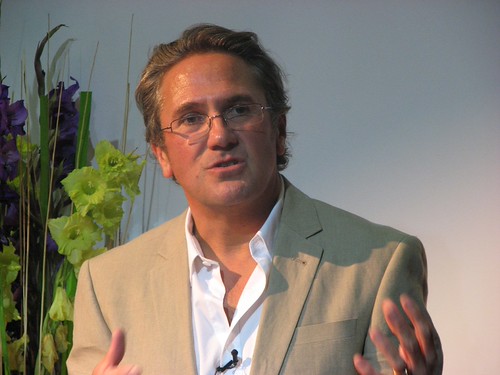
I know what Umair Haque is getting at in his Awesomeness Manifesto. Innovation is over used and most of the time treasured over all else but I'm concerned about some of Umair's examples to tell the truth.
Innovation often isn't. Innovation means, naively, what is commercially novel. Yet, as the financial crisis proves, what is “innovative” is often value destructive and socially harmful. Financial “innovation” turned out to be unnovative: it has destroyed trillions in value – here are some staggering estimates from the IMF.
It's time to ask: have the costs of innovation exceeded the benefits?
A better concept, one built for a radically interdependent 21st century, is awesomeness. Here are the four pillars of awesomeness:
Ethical production. Innovation turns a blind eye to ethics — or, worse, actively denies ethics. That's a natural result of putting entrepreneurship above all. Buy low, sell high, create value. That's so 20th century. Awesome stuff is produced ethically — in fact, without an ethical component, awesomeness isn't possible. Starbucks is shifting to Fair Trade coffee beans, for example. Why? Starbucks isn't just trying to innovate yet another flavour of sugar-water: it's trying to gain awesomeness.
Insanely great stuff. What is innovative often fails to delight, inspire, and enlighten — because, as we've discussed, innovation is less concerned with raw creativity. Awesomeness puts creativity front and center. Awesome stuff evokes an emotive reaction because it's fundamentally new, unexpected, and 1000x better. Just ask Steve Jobs. The iPhone and iPod were pooh-poohed by analysts, who questioned how innovative they really were — but the Steve has turned multiple industries upside down through the power of awesomeness.
Love. You know what's funny about walking into an Apple Store? The people working there care. They don't just “work at the Apple store” — they love Apple. Contrast that with the alienating, soul-crushing experience of trying to buy something at Best Buy — where salespeople attack you out of greed. (Or, as editor extraordinaire Sarah Green put it, “where you wander around for a full half-hour unable to find anyone to help you before you finally get the attention of some blue-shirted 12-year old who turns out to know nothing about the products she sells and ultimately end up committing hara-kiri with a Wii controller”). Their goal is to sell; the goal of Apple Store employees is simply to show off their awesomeness, and let you share it. Love for what we do is the basis of all real value creation.
Thick value. It's the most hackneyed phrase in the corporate lexicon: adding value. Let's face it: most value is an illusion. Nokia, Motorola, and Sony tried for a decade to “add value” to their phones — yet not a single feature did. Food producers and pharmaceutical companies claim they're “adding value,” but mostly they're just mega-marketing.
The vast majority of companies — in my research, greater than 95% — can only create what I have termed thin value. Thick value is real, meaningful, and sustainable. It happens by making people authentically better off — not merely by adding more bells and whistles that your boss might like, but that cause customers to roll their eyes.
I personally think the Apple store example is a mistake, they are there to sell and you'd be a fool to think otherwise. Yes its very different from the experience of going into Best buy but is it any different from going into Nike Town, Lush or most places? Awesomeness its not, actually I'd put Ikea in the position of Awesomeness. They lay the stuff out and you go around pick what you want, no pressure, no sale assistance just a warehouse of stuff with some gentle hints here and there. Now thats a awesome retail experience when it was unleashed on the public over 10 years ago.
Let's summarize. What is awesomeness? Awesomeness happens when thick — real, meaningful — value is created by people who love what they do, added to insanely great stuff, and multiplied by communities who are delighted and inspired because they are authentically better off. That's a better kind of innovation, built for 21st century economics.
I've talked to many boardrooms about awesomeness. Beancounters feel challenged and threatened by it, because it feels fuzzy and imprecise. Yet, it's anything but. Gen M knows “awesomeness” when we see it — that's why its part of our vernacular. It's a precise concept, with meaning, depth, and resonance.
What makes some stuff awesome and other stuff merely (yawn) innovative? I've outlined my answers, but they're far from the best, or even the only ones — so add your own thoughts in the comments.
You might be innovative — but are you awesome? For most, the answer is: no. Game over: in the 21st century, if you're merely innovative, prepare to be disrupted by awesomeness.
So awesomeness sounds a lot like wuffie or social capital. All of them make beancounters feel challenged and threatened natrually because of the lack of solid metric? I wonder if in the same way you can claim to be doing awesomeness. Instead other people tell you your doing awesome work? Oh by the way Awesome photo by the way Kulafire.







